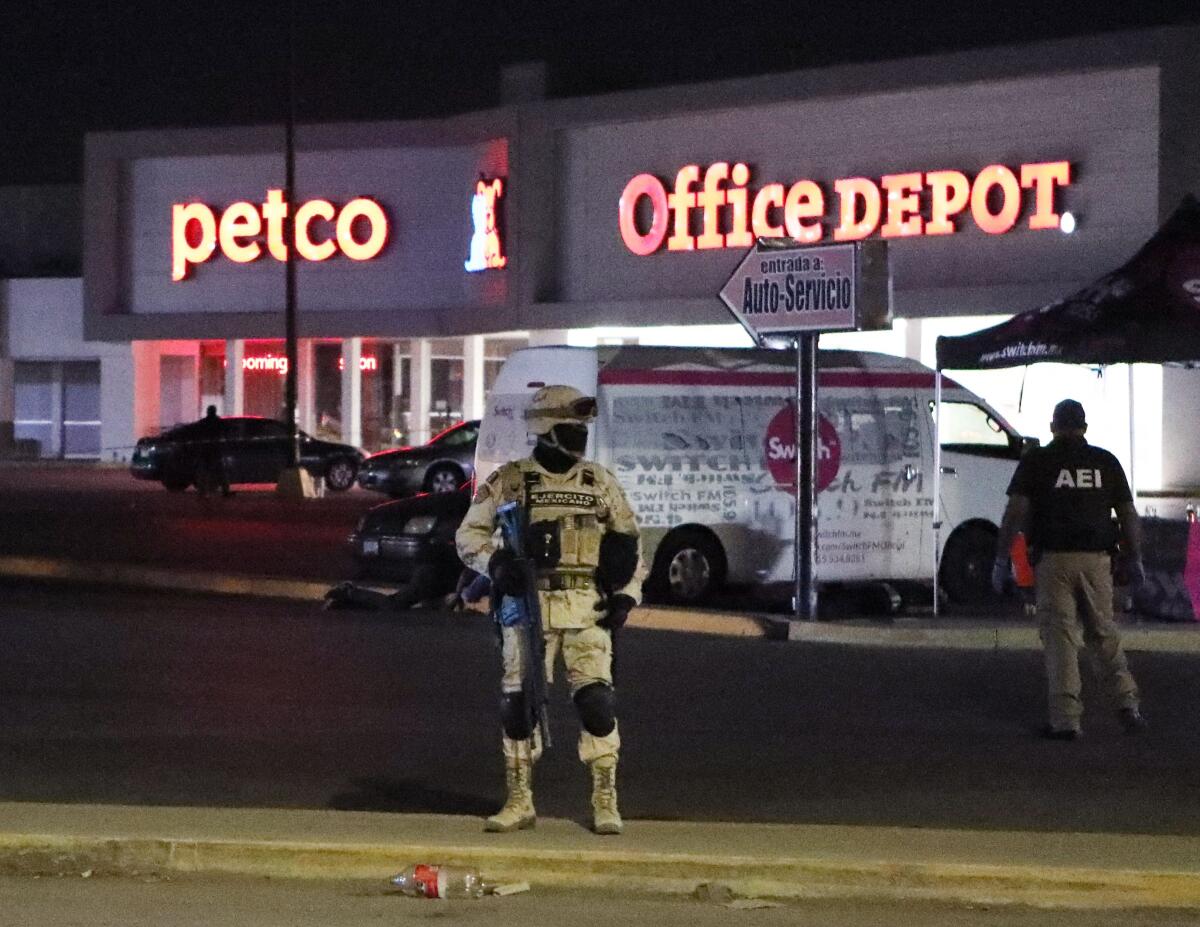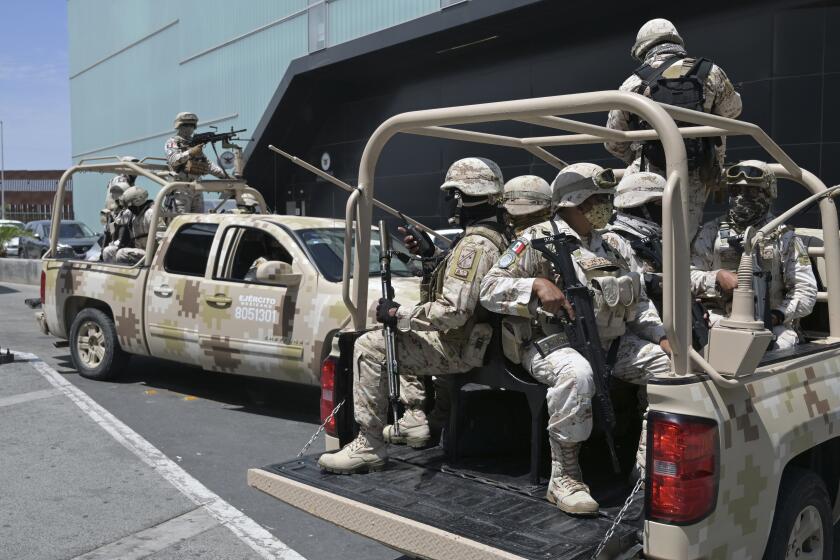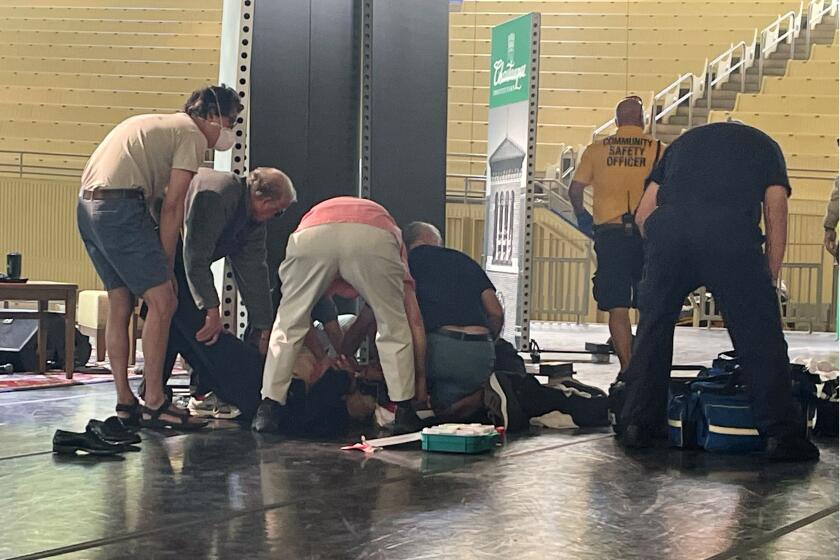Murders at the border and attacks in Jalisco and Guanajuato stun Mexico

- Share via
MEXICO CITY — Dramatic bouts of violence and mayhem in two regions of Mexico this week have left at least 12 dead and dozens of businesses torched, dramatizing the ability of crime gangs to wreak havoc and shatter the semblance of normality almost anywhere in the country without warning.
On Friday, hundreds of Mexican troops were dispatched to the northern border city of Ciudad Juárez in a bid to bolster security after a series of apparently random gang attacks across town on Thursday and early Friday that left at least 11 dead— including a popular radio personality and three of his co-workers, and two inmates shot in a prison riot. Assailants armed with guns and Molotov cocktails targeted convenience stores, gas stations, a pizza shop and vehicles.
The killings just across the Rio Grande from El Paso came days after roaming bands of criminals hundreds of miles away to the south set fire to dozens of shops, buses and cars, and threw up roadblocks on major arteries across a wide swath of the states of Jalisco and Guanajuato. Among the sites attacked there were some two dozen outlets of Oxxo, a nationwide fast-food, convenience-store chain. Authorities reported one fatality.
Baja California struggled Sunday to return to normality after cartel violence shut down much of the region Friday.
The dramatic incidents in distinct parts of the country were apparently unrelated: Officials said the bloody prison riot in Juárez sparked the rampage there in acts of retaliation, while authorities blamed the chaos in Jalisco and Guanajuato on cartel leaders outraged about plans to arrest them.
The episodes underscored the ability of Mexico’s multibillion-dollar criminal underground — outfitted with high-powered arms and flush with cash from drug trafficking, extortion rings, migrant smuggling and other rackets — to create turmoil.
Even many Mexicans accustomed to rampant lawlessness were stunned at this week’s anarchic images from Juárez and outside Guadalajara, Mexico’s second most populous city, in Jalisco state.
“The Mexican state has been overrun and can no longer protect its citizens,” tweeted Adrián López, director of the newspaper Noroeste.
Rushdie was taken by helicopter to a hospital. “The news is not good,” his agent said, adding that he had nerve and liver damage.
The deaths of the civilians in Juárez seemed especially shocking to many in a nation where people are accustomed to gangland assassinations of rival mobsters, politicians, journalists and others whose work or activism puts them in the crosshairs of criminals.
A widely shared belief in Mexico — albeit one of questionable validity — is that people can remain relatively safe if they go about their business while avoiding the criminal element. In his regular Friday morning news conference, President Andrés Manuel López Obrador categorized the attacks on people not linked to criminality as an event out of the ordinary.
“This is something that hadn’t presented itself before and hopefully won’t be repeated, because they attacked the civilian population, innocents, as a kind of retaliation,” López Obrador told reporters Friday. “It wasn’t just a clash between two groups, but they began to shoot at civilians. ... That is the most lamentable part of this.”
In fact, the murders of “innocents” have long been a byproduct of Mexico’s decades-long drug conflict. Many have been collateral victims— killed, for instance, in gang massacres targeting rivals in bars, restaurants, homes and other locales.
Sowing terror via the deliberate targeting of civilians with spectacular outbursts of firepower has also been part of the texture of Mexico’s tumultuous recent history.
“Random acts of violence create chaos and create fear and allow you to gain a tactical advantage over the authorities and your rivals,” said Alejandro Hope, a Mexican security analyst.
Most notorious, perhaps, was the 2008 grenade attack on a crowd gathered in a main plaza to celebrate Mexican Independence Day in the central city of Morelia. At least eight were killed and more than 100 wounded in one of the defining assaults by traffickers in the early days of Mexico’s so-called War on Drugs.
Juárez, with its strategic location along a key cross-border smuggling corridor, has long been a hub of mob mayhem, a place where gangsters strung slain rivals’ bodies from bridges or dumped their beheaded corpses in vacant lots. The so-called birthday party massacre in 2010 left 14 dead at a high school birthday gathering in Juárez.
The systemic failure to bring murderers to justice in a country where most killings go unsolved only adds to the incentive for criminals to target civilians, Hope added.
“If you go after random people in the streets, you should become a priority target for authorities,” Hope said. “But that does not happen. It sends a message [to criminals] that this is a good tactic.”
The latest attacks have intensified an overriding sense of insecurity for many in places such as western Guanajuato state, where rival gangs battle for control of drug-trafficking routes and black-market gasoline, while extorting local businesses.
“There’s no government here: Here the narcos are the government,” said Rogelio Cornejo Díaz, 54, who runs a fruit and vegetable stand in Celaya, one of the cities hard hit in the rolling attacks late Tuesday and early Wednesday in Guanajuato state. “If the president thinks all is fine and tranquil, he should come here sometime with his wife and children to see for himself.”
Violence has ebbed somewhat in Juárez in the last decade, but Thursday’s events demonstrated the enduring power of criminal mafias — both sophisticated, trans-national cartels and lower-level street and prison gangs.
The trouble in the border city began Thursday afternoon in a dispute between rival gangs at a state prison, Ricardo Mejía, Mexico’s deputy security minister, told reporters at the president’s daily news conference.
Battling each other, Mejía said, were groups known as Los Chapos — apparently linked to the Sinaloa Cartel formerly headed by Joaquín “El Chapo” Guzmán, now imprisoned for life in the United States — and a local prison band known as Los Mexicles.
A riot left two prisoners dead and at least 20 injured, Mejia said. It was unclear what caused the dispute. But authorities said Mexicles members outside the prison went on a rampage, killing at least nine people.
The victims included the four staffers of Mega Radio —shot dead in the parking lot of a Caesars Pizza outlet. It was unclear if Alán González, the announcer, and his three colleagues were random victims or were targeted in one of the world’s most dangerous countries for journalists. Also among the dead were two women who apparently succumbed to smoke inhalation after the Rapiditos Bip Bop convenience store (part of the Oxxo chain) was attacked with a Molotov cocktail.
María del Refugio Ramírez, 54, was a longtime employee, and Saira Janet de Santiago Castro, 18, was applying for a job at the store, according to media reports.
Neighborhood residents erected a shrine outside the store Friday.
Another man in Juárez was reported shot dead in his truck on Thursday, while another victim, also male, was fatally shot on the street, authorities said.
The youngest victim was a 12-year-old who was shot at a Circle K store, officials said. He died Friday after doctors were unable to revive him.
Most shops and offices in the border city were closed Friday as many feared a repeat of the violence. Police and army vehicles patrolled the streets.
The dramatic events of recent days sparked a renewed round of criticism of President López Obrador’s controversial security strategy.
In seeking election, López Obrador promised to take a more holistic approach to fighting crime. He vowed to reject the militarized strategy of his predecessors and boost social programs for young people vulnerable to joining gangs.
But Mexico’s homicide rate has dipped only slightly since López Obrador took office in December 2018, and there is little evidence of a diminution of the power of organized crime gangs.
“We’re in a high-violence equilibrium that has become self-sustaining and that government policy is doing very little to change,” said Hope, the security analyst.
Special correspondents Cecilia Sánchez in Mexico City and Gabriela Minjáres in Ciudad Juárez contributed to this report.
More to Read
Sign up for Essential California
The most important California stories and recommendations in your inbox every morning.
You may occasionally receive promotional content from the Los Angeles Times.
















